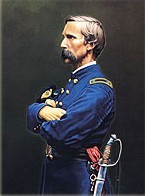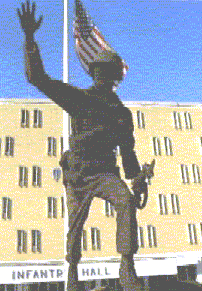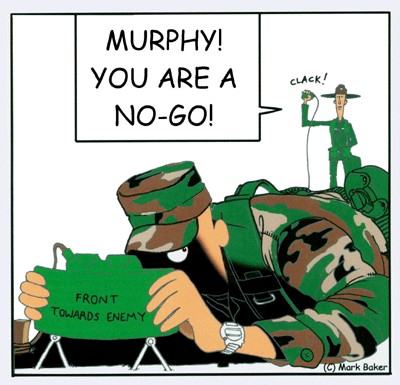NCOs NEED TO PITCH IN
THE FORT BRAGG POST

All across the great post of Fort Bragg are heard horror stories of Soldiers E-5 and under being "worked to the bone" and up late hours while their This bureaucratic military "culture of harassment" is not PROFESSIONAL leadership-by-example that inspires every Soldier at every level do so his/her best; in fact, if you took a poll of E-4 and under Soldiers many would probably get out of the U.S. Army today if given the opportunity.
It is the responsibility of company-grade officers to see to it that their men are led by leaders who have unselfish, personal examples and do not harass the men. Men like Gavin, Ridgway, Sherman, Chamberlain, Audie Murphy, John Paul Vann, Alvin York, Roy Benividez, David Hackworth-who made a differance in their day. Now its our turn to make the differance. They set the tone with their own conduct. They need to do whatever sacrifice it takes to earn the respect of the men that they do the same work as their men. "Zero defects" mentalities do not inspire the men to give their best, we must create an atmosphere where subordinates can use their personality and initiative to get the mission done. Mission-type orders not robotics. To win on the future, non-linear urbanized battlefield, where we had only just arrived within hours by AIR will require the Soldiership like that of Chamberlain and his men on Little Round top. These men must be able to communicate freely and truthfully without concern over their ego, peer status or career concerns. The following link describes the ideal NCO-Soldier relationship where friendship is allowed and enhances mission performance:
Notice how the outstanding NCO in this true story handled the situation? And the POSITIVE results he obtained? Did he write up counseling statements? Article 15 proceedings?
Another NCO writes:
I'm an NCO, supporting a Special Forces group. I just completed an NCOES school, and am still really worried about the kind of Soldier I saw graduating alongside me. I could count on one hand the troops there I would trust to watch my back. One of SSGs was almost paralyzed when trying to set up a hasty ambush, terrified of "doing the wrong thing." What the hell is a school for, if not to learn to lead? We are losing the strong leadership core we had, as old guys retire, or simply seek better hunting elsewhere. The leadership is suffering, gentlemen, and it is hard to see a way out. An NCO has to cover himself seven ways from Sunday to avoid getting in trouble himself, just while disciplining Soldiers. All of the headlines, giving the Military a bad name in the last several years, can all be attributed to poor leadership, but that is never addressed! The reaction to Aberdeen? All Soldiers are required to wear these plastic tags stating the Army Values on their dogtags. I wouldn't recommend simply going back ten, twenty, fifty years in our leadership style; no, it's better to change, improve, learn, and move on. The kinder, gentler style is eroding the fine edge of combat troops. The marines, at least they all consider themselves to be fighters first and foremost. Somewhere along the line, the Army decided to move away from that. Why? I wish some old NCOs out there would give up an answer, an idea."
There are answers and I'd like to kick some ass with you right now on this.
First off, the risk-aversion mentality created by our soci-political environment is undeniable. There are solutions that I use DAILY to fight this!!!
1. CLASSIC MILITARY EDUCATION
The way to get that NCO or young officer to have the strength of character to be tactical is CERTAINTY. To have that certainty he must be CERTAIN! To do this he must have tactical CONVICTIONS. I say, in the U.S. military we teach BS rote memorization of technical details. We teach:
"The M16 is a 5.56mm, gas-operated, lightweight, shoulder weapon".
Fine start if you are a draftee Army trying to field 50+ Divisions to win WWII against the Germans and Japanese, except------------this ain't WWII. We are a professional Army--no time to draft and mobilize, we win with what we got and this means everyone's head is in the game.
We should teach:
"The M16 is an assault rifle, designed to give point accuracy at moderate ranges and full auto or burst at close ranges for trench/room clearing. Its designed to be a means to suppress the enemy so elements not in contact with the enemy can move closer and get into a line-of-sight position to get killing effect on the enemy. This is not always possible or advisable, there are other weapons like mortars which have 7 times the range which need to be employed to gain the battefield results we seek---cutting off the enemy as we pursue is one example. For these things to work, there can be no delay in action--the leader on the scene has to make quick decisions in order to get these elements in motion before the enemy escapes or gains the upper hand in fire superiority"
What am I saying?
Classical Military Education Book list
READ B.H. Liddell-Hart's STRATEGY.
And Rommel's Attacks.
Build in our men to FIDO (F---it, Drive On) that by CONVICTION they must do what has to be done tactically--but first they must KNOW WHAT RIGHT IS. I say in the U.S. military we do not know what the technotactical "RIGHT" is.
Read Anton Myrer's Once an Eagle---be like Sam Damon.
Watch the TV mini-series.
2. DOMINATE THE SITUATION WITH TECHNOTACTICS
Once you have a "handle" on the operational art, then dominate the thinking of your unit by technotacticals-------just like I gave you an example above on the close-range firefight. Talk it up. Even if others outrank you, their ideas don't outrank you---in fact your ideas outrank their ideas of PC BS. Once your ideas get out there, they will trump theirs and you will become the defacto leader. Sorry, but its always been that way.
For example, take a look at the web page below:
In my BFV unit we have a bunch of folks who all they want to do is eat MREs all day and run no more than 20 feet from the vehicle. The BFV crewman use the BFV as an excuse to being slackers, so you show them they "ain't" doing all they can do even in their little mounted crewman "hang-out". Use a current event like the Russians dying in Chechnya from a lack of mounted crewman sniper protection. Since they are currently unmotivated lard asses ("We are just Mech, we are low-speed" is their thinking), take their CVCs away from them and cover them with a helmet cover. Seize-the-day, seize the initiative NOW before you are at JRTC and they are screwing up (been there, done that).
Be the AAR leader. when AARs are written, write yours and pull no punches!!
CONVICTION gentlemen!!! Gen X/Y has none because it doesn't believe in feces, show them what to believe in. THEN--they will stand up to the prevailing PC socio-eco BS of the day. Lead-by-example.
Men are hanging in the balance as well as the fate of freedom and this nation.
Have a unit movie night: watch the movie "The Rough Riders" with Sam Elliot and Tom Berenger. Consider Teddy Roosevelt-------
"Believe passionately, Act Boldy, proceed Strategically"
Teddy Roosevelt
Ever read his "Man in the Arena" speech?
3. Mangudai Training = Mini-Ranger school
Recently retired General David Grange used to take his staffs away from their daily routines and put them through a surprise mini-Ranger school......
http://www.militarycity.com/features/army/awesome/index.html
http://www.militarycity.com/features/army/awesome/change.html
http://www.militarycity.com/features/army/awesome/test.html
4. EIB training--not CTT!!!
SF units can conduct EIB training----do it!! Get SF units EIB qualified------
www.reocities.com/Pentagon/9063
Do it in a foreign language (links included) to help your FID, UW missions out.
"The Mongols, a classic example of an ancient force that fought according to cyberwar principles, were organized more like a network than a hierarchy. More recently, a relatively minor military power that defeated a great modern power--the combined forces of North Vietnam and the Viet Cong--operated in many respects more like a network than an institution; it even extended political- support networks abroad. In both cases, the Mongols and the Vietnamese, their defeated opponents were large institutions whose forces were designed to fight set-piece attritional battles.
To this may be added a further set of observations drawn from current events. Most adversaries that the United States and its allies face in the realm of low-intensity conflict, such as international terrorists, guerrilla insurgents, drug smuggling cartels, ethnic factions, as well as racial and tribal gangs, are all organized like networks (although their leadership may be quite hierarchical). Perhaps a reason that military (and police) institutions have difficulty engaging in low-intensity conflicts is because they are not meant to be fought by institutions. The lesson: Institutions can be defeated by networks, and it may take networks to counter networks. The future may belong to whoever masters the network form."
"Cyberwar is coming" by John Arquilla and David Ronfeldt International Policy Department RAND


"For two centuries I have kept your Nation safe, Purchasing freedom with my blood. To tyrants, I am the day of reckoning; to the suppressed, the hope for the future. Where the fighting is thick, there I am...I am the Infantry!
FOLLOW ME!"
All jobs are necessary. The more rank you have the more you are expected to be the most physically fit, tactically proficient and most inspirational to the men; if all goes to ruin, it must be you who is the lone Paratrooper who picks up the rocket launcher that kills the tank, it must be you who leads the pinned down force off the drop zone to sweep the enemy. It must be you who makes the U.S. Army face problems head-on and solve them, not ignore them. It must be you.
WHAT OUR SOLDIERS HAVE A RIGHT TO EXPECT FROM THEIR LEADERS
* Honest, just and fair treatment.
* Consideration due them as mature, professional Soldiers.
* Personal interest taken in them as individuals.
* Loyalty.
* Shielding from harassment from "higher up".
* That their needs be anticipated and provided for.
* All the comforts and privileges practicable.
* To be kept oriented and told the "reason why".
* A well-thought out program of training, work and recreation.
* Clear-cut and positive decisions and orders which are not constantly changing.
Demands on them comensurate with their capabilities--not too small--not too great.
* That their good work be recognized, and publicized when apropriate.
Bruce C. Clarke
General, U.S. Army
FEEDBACK!!!!
"It's ony from my own experience but personally the officer has two choices, put his or her dislikes aside and be mature about working with someone they don't like or he or she can leave. The nco's shouldn't have to suffer the abuse of authority from anyone in a high ranking postion.They're there to lead us not the abuse the priviliges granted to them. But like I said it's only my opinion and speaking from experience. I just hate it when the
people with so little power get walk all over and are the ones left to fend for themselves. It's frustrating!!!
spardy@beothuk.swgc.mun.ca (Shelly R. Pardy), Canadian Army NCO
"One of the things I believe must be articulated is the personnel problem. With the drawdown of the Armed Forces, a career "elitism" has developed whereby "zero defects" apply, i.e., junior officers are not permitted to make mistakes common to learning the job without it being a career-stopper. Accordingly, everyone is out to "CYA" instead of taking the risks associated with making things happen. Senior officers are more interested
with not making waves to get the next career-development job more than for the welfare of their organization. Good officers are leaving the service rather than being developed into good leaders. This impacts on unit morale and cohesion because of the uncertainty about what to expect from the leadership. No one wants to "stand up and be counted" anymore. "Looking
good" rather than being effective seems to be the Code."
Chuck Hoskinson, LTC, USA, Retired
"What with the repercussions of posting to the list, I can't say that I blame people for being less than forthcoming about current issues within the CF. I can only say that NO form of abuse of authority should be tolerated at any level. I know for a fact that if I personally came across it, I would not put up with it. It has nothing to do with whether I believe that women should be in the combat arms (I don't think they should be). They are, and as such it is my duty to ensure that they are treated the same as any other Soldier. Leaders should be professional enough to overcome their personal beliefs, and carry out their orders. You will notice that I said should... As Gen Baril said, anyone who can't should get out of uniform. Period."
Alter Ego
What is also interesting is that information does not travel at the same speed along the chain of command. This is to say that it may take a CO relatively longer to receive an answer from the CoS or BComd, than a Pte to receive an answer from his MCpl. It's speed also differs from one chain of command to another. This list has proven for example that those in Central Area quite often have confirmed information before those in LFWA. Even though the organizations of those areas are essentially identical.
What is all this rambling getting at? In response to the Major's
statement that using this list displays poor initiative, and a failure
to understand the chain of command. I disagree. It would be poor initiative to leave questions unanswered if there are means available to answer them, and the chain of command cannot answer them in a timely fashion.
Some questions may be better asked to, and answered by the chain of command. But questions on policy are in no poorer taste than a Major counseling a Lieutenant in public and in front of peers and NCM's
"I find that velocity of information is always an interesting topic.
Although the passage of information along the chain of command can be used as an example of efficiency at its finest, lateral communication will always, by nature, be more efficient.
-from Canadian Army mailing list

 Return to U.S. Army Airborne Equipment Shop
Return to U.S. Army Airborne Equipment Shop